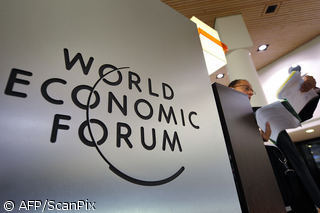The Estonian Finance Ministry predicts that the planned lowering of the personal income tax rate and increase in tax-exempt income will cause
Published:
4 August 2003 y., Monday
The Estonian Finance Ministry predicts that the planned lowering of the personal income tax rate and increase in tax-exempt income will cause
annual income tax revenues to decline by 1.35-3.97 billion kroons (EUR 86.26-253.67 mln) in the 2004-2007 period.
The coalition agreement of Res Publica, the Reform Party and the People's Union for the 2003-2007 period stipulates that revenue intake after lowering of the income tax rate should not affect the income of local
self-governments. Although the planned tax reform will reduce the state's annual revenue from the personal income tax by four billion kroons (EUR 256 mln) by 2007, the Estonian Finance Ministry doesn't see this as
a gap, because no area will be directly threatened.
Although strong domestic demand has supported the relatively rapid growth of the Estonian economy, the present level of the current account shortfall is very high and indicates increased vulnerability of the economy, the Finance Ministry finds.
"We expect the current account gap to narrow in the second half of the year provided the anticipated recovery of economies of our principal trade partners gives a boost to our export growth," the ministry's
analyst Erki Lohmuste said in a comment on the record current account deficit in the first quarter.
Šaltinis:
web-static.vm.ee
Copying, publishing, announcing any information from the News.lt portal without written permission of News.lt editorial office is prohibited.
The most popular articles
 Reform of the banking system was one of the key themes at this year's World Economic Forum in Davos, with bankers coming in for a lot of criticism.
more »
Reform of the banking system was one of the key themes at this year's World Economic Forum in Davos, with bankers coming in for a lot of criticism.
more »
 Small firms have been hard hit by the economic crisis, and so must be given incentives and support, including easier access to credit, help with innovation, tax breaks and less red tape, MEPs on Parliament's Special Committee on the Financial, Economic and Social Crisis (CRIS), and experts agreed at a workshop on Monday.
more »
Small firms have been hard hit by the economic crisis, and so must be given incentives and support, including easier access to credit, help with innovation, tax breaks and less red tape, MEPs on Parliament's Special Committee on the Financial, Economic and Social Crisis (CRIS), and experts agreed at a workshop on Monday.
more »
 The elections and investiture of Porfirio Lobo as President of Honduras have cleared the way for the EU to restore normal relations with the Central American country and negotiations for signing a bi-regional Association Agreement may soon resume.
more »
The elections and investiture of Porfirio Lobo as President of Honduras have cleared the way for the EU to restore normal relations with the Central American country and negotiations for signing a bi-regional Association Agreement may soon resume.
more »
 The European Commission has approved applications from Lithuania for assistance under the European Globalisation Adjustment Fund (EGF).
more »
The European Commission has approved applications from Lithuania for assistance under the European Globalisation Adjustment Fund (EGF).
more »
 The European Commission has decided to refer Italy to the European Court of Justice (ECJ) on the basis of Article 108(2) of the Treaty on the Functioning of the European Union (TFEU) for failing to comply with a Commission decision of July 2008.
more »
The European Commission has decided to refer Italy to the European Court of Justice (ECJ) on the basis of Article 108(2) of the Treaty on the Functioning of the European Union (TFEU) for failing to comply with a Commission decision of July 2008.
more »
 The EBRD is helping to strengthen the financial sector in Bosnia-Herzegovina (BiH) with a €50 million credit line to the Deposit Insurance Agency of Bosnia and Herzegovina (DIA), the Bank’s first investment in a deposit insurance entity.
more »
The EBRD is helping to strengthen the financial sector in Bosnia-Herzegovina (BiH) with a €50 million credit line to the Deposit Insurance Agency of Bosnia and Herzegovina (DIA), the Bank’s first investment in a deposit insurance entity.
more »
 In its first investment in the natural resources sector in Bosnia and Herzegovina, the EBRD is providing a €17 million sovereign loan to finance the gasification of the Central Bosnia Canton.
more »
In its first investment in the natural resources sector in Bosnia and Herzegovina, the EBRD is providing a €17 million sovereign loan to finance the gasification of the Central Bosnia Canton.
more »
 The EBRD is increasing the availability of financing to private businesses in Armenia with a $5 million credit line and a $3 million trade finance facility to ArmSwissBank for small and medium companies (SMEs).
more »
The EBRD is increasing the availability of financing to private businesses in Armenia with a $5 million credit line and a $3 million trade finance facility to ArmSwissBank for small and medium companies (SMEs).
more »
 On January 27 the European Commission assessed the action taken by Lithuania, Malta, Latvia and Hungary in response to recommendations proposed by the Commission and endorsed by the Council in July 2009 in respect to the correction of their respective budget deficits.
more »
On January 27 the European Commission assessed the action taken by Lithuania, Malta, Latvia and Hungary in response to recommendations proposed by the Commission and endorsed by the Council in July 2009 in respect to the correction of their respective budget deficits.
more »
 EUROSTAT announced that Lithuania’s GDP rose by 6.1 % in the 3rd quarter of 2009 versus the previous quarter.
more »
EUROSTAT announced that Lithuania’s GDP rose by 6.1 % in the 3rd quarter of 2009 versus the previous quarter.
more »